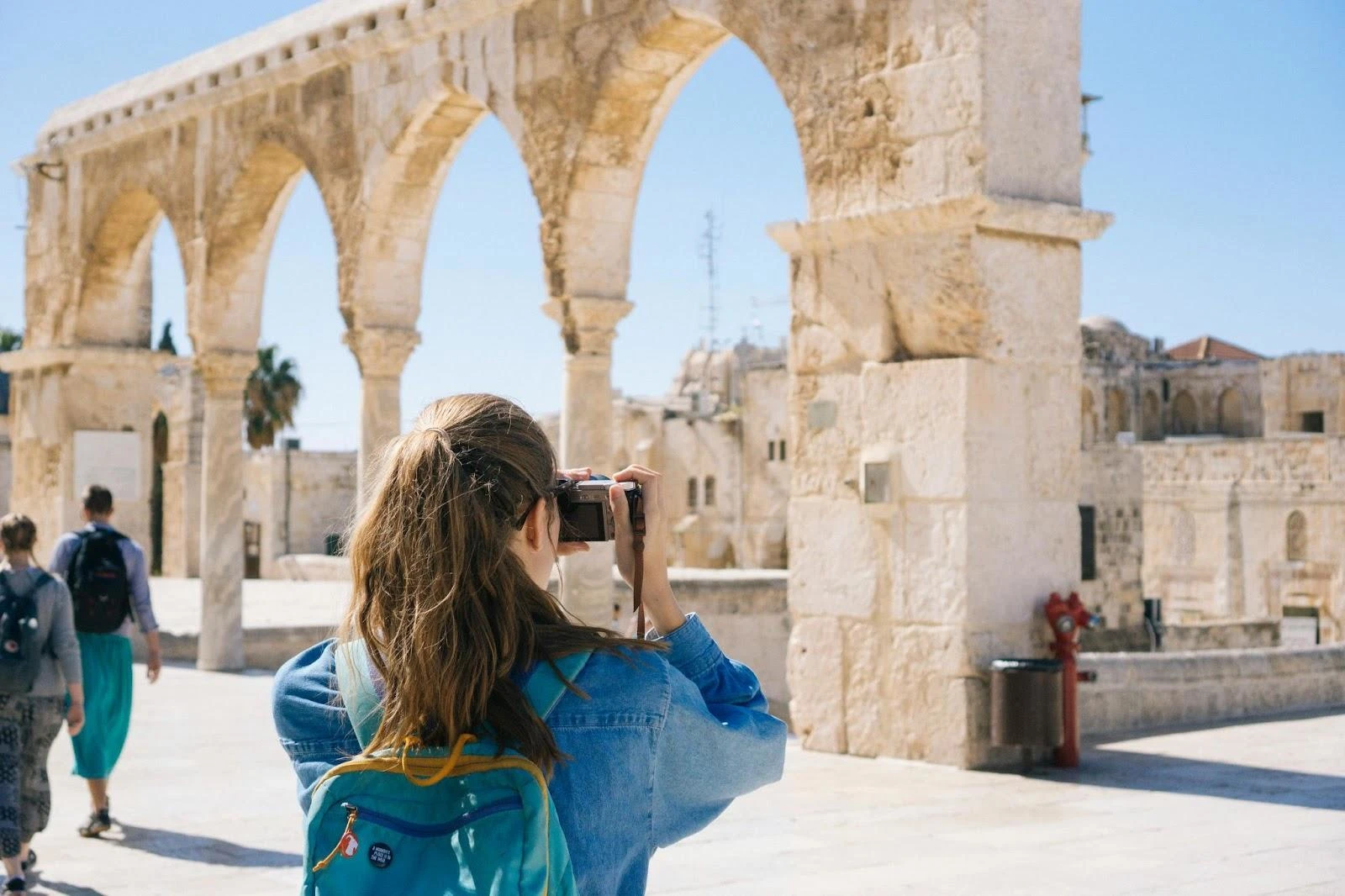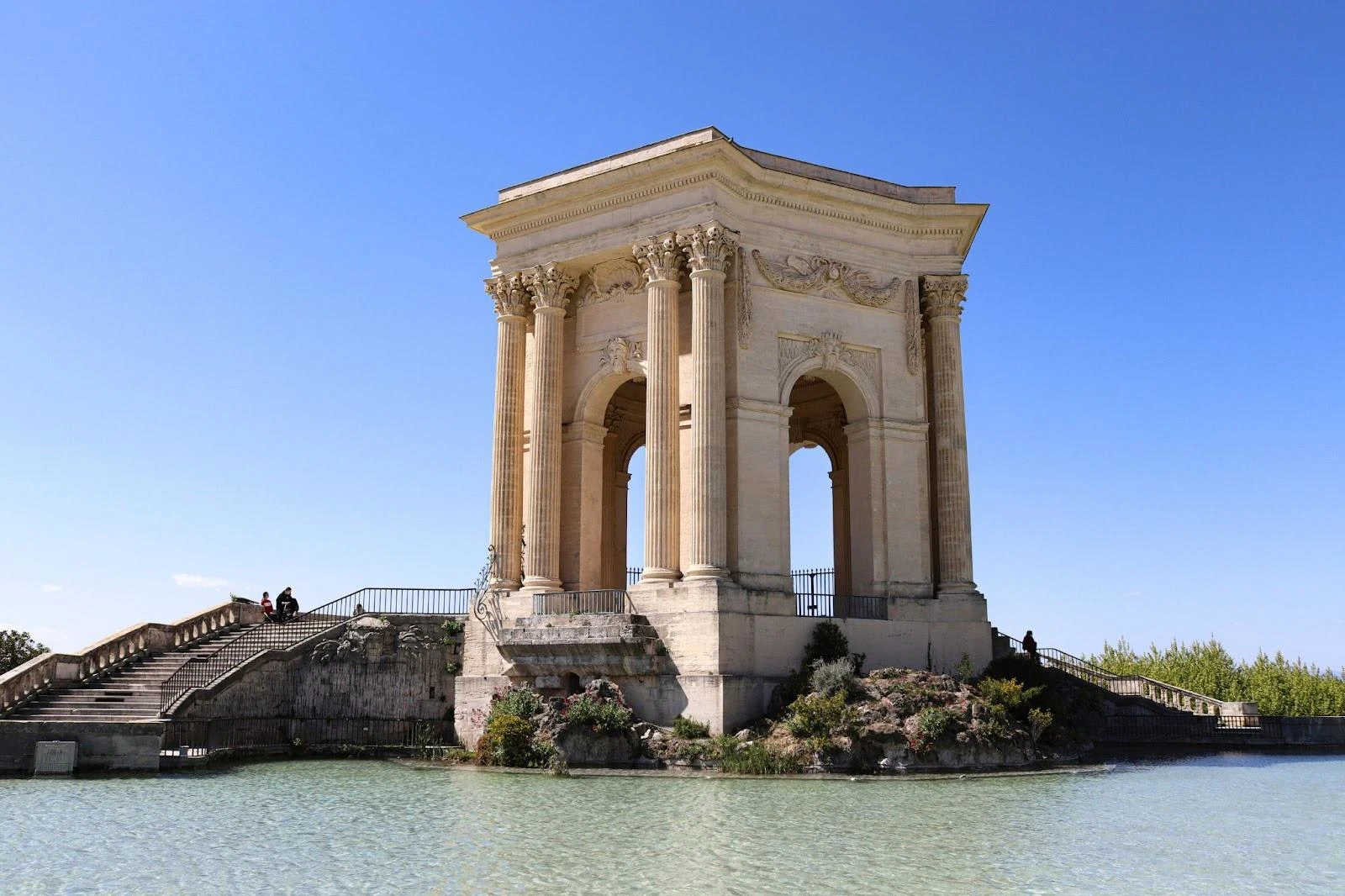4 Rules To Become an Ethical Tourist
4 Rules To Become an Ethical Tourist
As more residents of cities and foreign countries speak out against the growing rudeness of some visitors, it has become urgent to know the 4 rules for becoming an ethical tourist!

A woman taking a picture of an ancient monuments in ruin © Haley Black (Pexels)
What is Ethical Tourism ?
An ethical tourist is someone who respects the places they visit. Whether it's places of worship, memorial sites, or cultural locations, an ethical tourist respects the local population of the country or city they are exploring, as well as the local wildlife and flora.
No littering, no vandalizing monuments or important sites, no extravagant behavior, no aggressive or overly familiar interactions with locals or animals—in short, nothing that could offend those around them.
Does that seem easy to you? Well, think again! Unfortunately, more and more tourists appear to have forgotten the rules of etiquette, to the point where even countries as welcoming as Japan are raising their voices. This is particularly true when it comes to protecting geishas from the bad behavior of foreigners.
1. Golden Rule of Ethical Tourism: Respect Animals
Animal tourism accounts for a significant portion of the revenue of some countries, especially those with endemic wildlife and flora that can't be found elsewhere. These countries may sometimes allow the most cruel practices toward animals to satisfy the curiosity of tourists. It is therefore important to know the right practices to adopt in order to remain an ethical tourist with respect to our animal friends.
Don’t Take Pictures With Wild Animals
Animal tourism can give rise to cruel practices: animals may be captured, drugged, conditioned, and sometimes mutilated from a young age to keep them docile. And all of this is done solely to provide a souvenir photo for thousands of tourists.
A wild animal, especially when it is known to be dangerous, will never be lethargic at the sight of a human, whether it’s a baby or an adult. Therefore, it will be impossible to hold them for a photo op.
So, remember the one important rule in such cases: no selfies with baby tigers or any other wild animal that wouldn’t spontaneously come to you.
Do Not Ride Elephants
An ethical tourist would never take an elephant ride, as these animals have inevitably been brutally conditioned to be docile. Also, consider the risk of falling from such a large animal, which could ruin your vacation.
As for camels, it’s important to research the practices of certain breeders in advance. Not all are cruel, but some can also be violent with the animals they train.
This was the case in Egypt, where horses and camels were mistreated in the name of tourism. The country has now banned breeding for tourist purposes, much to the delight of animal rights activists.
This example proves that mobilization, or a decline in attendance at such attractions, can make all the difference. Being a conscious tourist also means refusing unhealthy activities that harm others.
Stay Away From Wild Animals
In Japan, the deer of Nara, overly tamed by humans, have become too dependent on people and are reproducing too quickly. The deer have also become more aggressive towards humans, while others have learned to bow to ask for food—a behavior that is anything but natural and highlights their dependence on the food offered by well-meaning tourists.
In general, the most ethical way to observe wild animals remains in parks and other natural reserves, which also need visitors' money to continue to exist. Tourism is important to sustain the feeding of protected animals in some sanctuaries.
However, be cautious once again: when it’s not animals being exploited, it’s sometimes humans who are displaced from their lands, as is the case in Tanzania, where Maasai communities are forcibly removed from nature reserves to make way for hunting and... tourism.
Before you visit a place, research it as you would if you were considering donating to a charity. Of course, nothing will ever be perfect, but it’s important to be aware of both the dark and the bright sides of popular attractions.
Investigate their practices, as the ethics of being an animal-friendly tourist also involves doing your homework beforehand.

A lioness resting on grass - Bibhash Banerjee (Unsplash) © Bibhash Banerjee (Unsplash)
2. To Be a Responsible Tourist, Think Like a Local
Taking an interest in a country you're visiting involves more than just going to the most iconic and popular places, and it also means avoiding staying in an insular bubble that separates you from the locals. Indeed, a visit to a country is never complete without experiencing local life!
Learn a Few Words in the Local Language
Learning a few words that you can use in conversation with locals is always appreciated. Don’t worry about having a perfect accent or mastering the language completely; your efforts will still be noticed.
Many French people mock the English accents of their compatriots, but foreigners will always appreciate that charming French accent, especially when it comes from a tourist who has taken the time to learn a few words to communicate with them.
Learn About the Customs of the Country You're Visiting
Understanding cultural differences between your country and another is crucial, especially when it comes to everyday gestures: how to eat, greet, and use hand signs, for example.
It's important to adopt the rules and good practices in a place where you might not be familiar with all the customs and traditions. For instance, in some Maghreb countries, you will often be expected to negotiate prices before making a purchase.
Certain gestures can also be confusing; for example, the V-sign for victory is considered an insult in the United Kingdom. In China, Japan, or South Korea, making noise while eating is a way to show that you appreciate the local food.
In the United States and Canada, tipping is also very important, as the vast majority of waiters would not earn enough to live on without relying on the generosity of customers.
Researching in advance is essential to avoid unpleasant surprises once you’re there and, most importantly, to avoid disturbing locals who are sometimes exasperated by the behaviors and lack of ethics of certain tourists, who are unfortunately becoming more common.
And it's always good to present a positive image of France abroad!
Be Cautious of Solidarity Tourism, or "Voluntourism"
Going on vacation to volunteer might sound like a dream. Teaching poor children in remote villages, helping kids in orphanages—these initiatives seem to stem from good intentions, but voluntourism is not an ethical practice.
First, because these missions often become a real business, disrupting and mistreating the children that tourists genuinely want to help. Volunteers come and go, and the most vulnerable, often children, become attractions, curiosities, and are sometimes even removed from their families solely to fill the orphanages where travelers will work.
An important rule to remember: it is wiser to leave this work to NGO members who will stay on the ground long-term and understand the populations and countries involved. Ethical tourism also knows its limits, recognizing that some interventions do more harm than good.

Two women dancing in traditional Mexican dresses © Sydney Rae (Unsplash)
3. Be a Respectful Tourist of the Places You Visit
Ethical tourism extends beyond living beings, and although stones have no consciousness, it is essential to show respect for the history and culture of a country, which also constitutes its identity. By insulting these special places, an entire population may find itself inadvertently insulted.
Respect Places of Worship
There are many rules, all different, depending on the religions and countries you visit, and an ethical tourist will always try to learn about these rules, even if they are not a follower of the religion in question.
In some mosques, as well as certain churches, such as Orthodox ones, specific dress codes are required. This often means covering yourself adequately, though a particular style of clothing may not be imposed. Sometimes, it may even be necessary to cover your head.
Rules vary according to religion or religious denomination and might even surprise you at times. For example, in Japanese temples, walking in the middle of the path leading to the temple means walking in the area reserved for the gods, and of course, this is not appropriate!
In countries that are, like France, predominantly secular and atheist/agnostic, visiting churches, for example, does not require a special dress code, as these buildings are now more a part of cultural heritage.
In any case, lowering your voice and maintaining a calm demeanor is a universal rule of decency, not just a matter of tourist ethics. These places, while they may attract the curious, are also visited by faithful individuals who deserve respect.
No Photos or Selfies with Questionable Poses
Taking selfies to remember the best moments is a natural vacation reflex, and it’s clear that we didn’t wait smartphones to do that. However, the big change lies in the fact that with new technologies come some very bad habits.
Social media places us in a constant context of self-staging. We no longer take photos just for ourselves and our families, but also for our followers and the entire internet.
Thus, it is not uncommon to see some tourists disrespecting the memory of solemn places or the culture of the country they are visiting, by ridiculing themselves in order to win likes through tasteless selfies.
This is the case at Auschwitz-Birkenau, where many tourists take selfies on the tracks that were used to transport trains to the former extermination camp, or smiling in a place of solemn reflection. Frustrated by these behaviors, the memorial had to ask visitors to stop taking such selfies.
The same outrage occurred in Florence, Italy, where a tourist took a photo with the statue of Bacchus while striking very explicit poses.
As you can see, being an ethical tourist also means resisting the pressure from social media that pushes us to act in increasingly ridiculous ways at the expense of memorials and heritage. It also means knowing when to disconnect sometimes.

Water Castle of Montpellier in Esplanade du Peyrou, France © Nathan Cima (Unsplash)
4. Alleviate Mass Tourism in the Name of the Environment
To become the king or queen of eco-tourism, avoid the crowded places and instead seek out those that are trying to attract visitors. There will always be a place looking for tourists!
Don’t Give In to the Craze for ‘Instagrammable’ Places
Although it may seem counterintuitive, it is advisable not to post too many Instagrammable photos of your discoveries. Instagram is one of the most popular social media platforms, but it is also a major driver of mass tourism.
Posting a photo potentially exposes it to thousands or even millions of people, who might all consider visiting the place that caught your eye.
In Barcelona, for example, tourists are sometimes targeted with water guns by locals frustrated by the overcrowding in their city. So, before you go, do some research to avoid provoking the water-throwing attacks of residents overwhelmed by mass tourism.
Being an ethical tourist also means being creative in finding the best spots away from the eyes of other curious visitors! Prefer the old-fashioned word-of-mouth, and don’t broadcast your favorite places to the world, but rather to those around you.
If you do wish to visit iconic and famous locations, doing so outside of peak seasons and major holidays can also be a solution, as it allows locals to breathe a bit and prevents adding to the already large crowd of curious tourists.
Sustainable Tourism Also Means Local Tourism!
Here's a final tip: it is possible to remain an ethical tourist on a budget by exploring the most fascinating places within your own country. Indeed, it is highly likely that you haven't yet discovered all the fantastic and unusual spots around you.
Again, consider places that aren’t crowded with too many curious visitors, and focus on discovering locations that will make you feel like more than just a tourist, but a true adventurer.

Florence, Italy © Jonathan Korner (Unsplash)
Although these rules may seem like common sense, it can sometimes be easy to forget one's ethics and get carried away by the excitement of the moment, especially in a place being visited for the first time. So keep these 4 rules for becoming an ethical tourist in mind, and the adventure will be all the more enjoyable for you and for others!
Kimberley Sanson
(Translated from French)
Like this project
Posted Mar 24, 2025
The 4 rules for becoming an ethical tourist.
Likes
0
Views
5






